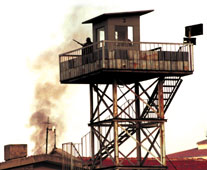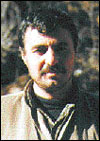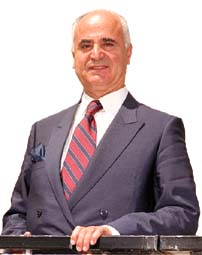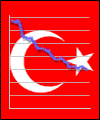11
April 2001
![]()
2. "Hunger strike in Turkish jails
claims 4 lives", the Turkish prison system was approaching
another crisis last night after a leading doctors' organisation warned
that it appeared inevitable that more inmates would die soon from hunger
strikes.
3. "Unity in action essential", Tas
said that the protests developing in Turkey, particularly those among
the shopkeepers, were devoid of leadership and organization, and made
an urgent call for unity in action of all the leftist, democratic, and
opposition circles, especially HADEP and ODP.
4. "Turkey denies any pledges on military cutbacks",
Turkey has denied that it provided commitments to the International
Monetary Fund for a reduction in defense expenditures.
5. "Turkey losing its future", according
to a survey conducted by McCann-Erickson WorldGroup's Strategic Planning
Department, while young people lose hope in the future because of the
economic crisis in Turkey, employees are very angry for having to lower
their life standards.
6. "Iraq protests at management of UN oil-for-food
programme in Kurdistan", the United Nations has kept its
humanitarian oil-for-food programme in Iraqi Kurdistan under wraps from
the Baghdad regime, in violation of the accord, the official INA news
agency reported Tuesday.
1. - The Christian Cience Monitor - "EU's Commissioner: Things must change on the ground":
Turkey weighs cost of EU integration
DIYARBAKIR / By Chris Morrison (BBC)
Dozens of children chase soccer balls along the narrow,
potholed streets. Others play in the dust. Small groups of people loiter
on nearly every corner.
In some places, Diyarbakir resembles a refugee camp, and in many respects
it is. Hundreds of thousands of villagers, forced out of the countryside
by the Army over the past few years, arecrammed into this mainly Kurdish
city. By every social and economic indicator, it is the poorest region
in the country - and the biggest obstacle to Turkey's aspirations of
joining the European Union.
The EU has criticized Turkey's treatment of the minority Kurds, saying
EU acceptance hinges on fundamental change. But parts of the Turkish
establishment fear thatimplementing economic and political reform might
encourage the Kurds to push forautonomy or even independence.
The reality of integration with the West is forcing Turkey to decide
just how European it wants to be.
For two decades the southeast was at the center of the brutal conflict
between the Turkish state and Kurdish rebels from the Kurdistan Workers
Party (PKK). Since the capture and trial of PKK leader Abdullah Ocalan
in 1999, the fighting has almost stopped. But promises of massive economic
investment have yet to be put into practice, and freedom of expression
is still tightly controlled in a region governed under emergency rule.
"The number of killings has gone down compared to a few years ago,"
says Mehmet Ozal, as he pushes a cart loaded with vegetables along the
street. "But in other respects things are terrible, and people
are waiting for change."
Last month Turkey released details of a "National Program"
of proposed reforms, in line with its bid for EU membership. This massive
undertaking has much to commend it, but on crucial political issues
like the Kurdish question it falls far short of European expectations.
At the heart of the debate is the right of individuals to use the language
of their choice. A few years ago the use of Kurdish was strictly forbidden,
even though an estimated 12 million people here are of Kurdish origin.
The restrictions have been eased, but many influential parts of the
establishment, including the armed forces, believe that is is quite
enough.
The National Program states that Turkish is the country's official language,
but it says other languages and dialects can be used in daily life so
long as they do not promote separatism. But the EU wants much more specific
reform. It believes Turkey should allow Kurds to broadcast and educate
children in their own language. Nationalists fear that this would reignite
Kurdish rebellion and weaken national unity.
The sensitivity of the debate was revealed late last month when Turkish
Prime Minister Bulent Ecevit ordered government offices to prevent people
using Kurdish place names. He called the place names an "attempt
to create an artificial separatist movement."
Meanwhile, in this region, hopes have faded that a new era of political
liberalization was beginning, and many people in Diyarbakir are bitterly
disappointed. "The problem is that people cannot express themselves
freely," says the city's Kurdish mayor, Feridun Celik. "The
state has to trust its people and respect their cultural diversity."
But walking around Diyarbakir, the limits of official policy soon become
apparent. Modern technology has brought satellite dishes to every building,
beaming Kurdish language TV stations from Europe.
"Everyone watches Kurdish TV," says one man, who wouldn't
give his name. "My mother doesn't understand Turkish. What else
do they expect her to do?"
Many pro-European Turks agree that change is long overdue, but there
are profound political disagreements about how Turkey should approach
reform over the next few years.
Nationalists fear the PKK is using politics to make the gains it failed
to win on the battlefield. Mr. Ocalan has certainly changed his tune,
and he now speaks from his prison cell of his democratic project. The
fact that Ocalan and many other Kurds have begun framing their demands
for change in European terms makes Turkey's European dilemma even more
acute.
"This is a culture where compromise is often seen as a sign of
weakness," says one Western diplomat, "and that makes things
more difficult."
A certain amount of soul-searching is inevitable, and the European Union
is prepared to bide its time."Things must change on the ground,"
says the EU's Commissioner for Enlargement, Gunther Verheugen. "We
need to see a different reality in Turkey."
But while the EU may be ready to wait for reform, there is much less
patience in Diyarbakir. "We want to live like Americans, like Europeans,
like the rest of Turkey," says Hamdullah Aktas, a displaced villager
sitting in his small apartment. "We Kurds should have the same
rights as everyone else, but at the momentwe're stuck." ![]()
2. - Guardian - "Hunger strike in Turkish jails claims 4 lives":
ISTANBUL
The Turkish prison system was approaching another crisis last night
after a leading doctors' organisation warned that it appeared inevitable
that more inmates would die soon from hunger strikes.
"We are expecting news of further deaths at any moment," the
Ankara Medical Association said. "There is no time to waste."
The government had called on the hunger strikers to end their protest,
but three people have starved to death since Saturday - two inmates
and a young woman protesting in solidarity with her imprisoned brother.
Another inmate died last month.
The hunger strikers are members of extreme leftwing groups which want
to overthrow the state. Their mass protest began last October over plans
to transfer prisoners from dormitory wards into new jails with smaller
cells.
In an effort to break the hunger strike, Turkish security forces stormed
20 jails in December and transferred about 1,000 inmates to the new
prisons. Thirty prisoners and two soldiers were killed in four days
of clashes, but the enforced transfers did not end the "death fasts".
The latest victim was Gulsuman Donmez, whose brother is on hunger strike
in prison. Donmez died in a house in Istanbul on Monday night after
an intermittent hunger strike which lasted 147 days. Several other inmates'
relatives are reported to be in a critical condition.
It is not known how many prisoners are still refusing food, or whether
they are taking vitamins or any other supplements which could prolong
their lives. According to official figures, about 300 inmates are taking
part in the protest, but local human rights groups believe the number
could be twice as high.
More than 120 people have been taken to hospital with symptoms of advanced
malnutrition, including memory loss, partial paralysis, vomiting, diarrhoea,
badly blurred vision and deafness.
Last week the international pressure group Human Rights Watch called
on the Turkish government to take steps to bring the hunger strike to
an end. It condemned the new "F-Type prisons", which it says
contravene international standards.
"The isolation regime in F-type prisons is physically and psychologically
damaging to prisoners and should never have been instituted in the first
place," the group's spokeswoman, Holly Cartner, said.
Four F-type prisons - with cells which hold up to three people - are
now in operation. Inmates are only allowed out of their cells once a
week if a close family member visits. The hunger strikers want the system
to be abandoned.
The ministry of justice, however, says it is not responsible for the
protest, and that there is no question of giving in to the inmates'
demands.
The government insists that it had a duty to regain control of the prison
system. In the old dormitory wards inmates used to run their own affairs,
and indoctrinate new recruits.
With Turkey immersed in an economic crisis, the hunger strike has received
little attention. But observers warn that the death toll could rise
dramatically if no action is taken. ![]()
3. - Ozgur Politika - "Unity in action essential":
Tas said that the protests developing in Turkey, particularly those
among the shopkeepers, were devoid of leadership and organization, and
made an urgent call for unity in action of all the leftist, democratic,
and opposition circles, especially HADEP and ODP.
PKK Council of Leaders member Nizamettin Tas said that democratic transformation in Turkey could only leap forward by basing on the dynamic mass in Kurdistan and stressed the necessity of uniting the economic demands in Turkey with the political demands and the democratic opposition in Kurdistan.
Tas spoke by telephone on the Gundem (Agenda) program on MEDYA TV the other evening along with Metin Aycicek from OZGUR POLITIKA and author-journalist Irfan Cure. Tas stressed the urgency of all powers, great and small, which call for democracy and change - especially the People's Democracy Party (HADEP) and Freedom and Democracy Party (ODP) - to unite around a program of leadership that would not contradict the demands of the people and continued to say the following: "Unity in urgent action is necessary for this. If these people who are rising up are not united, then it will be a betrayal of all values. All powers which want democracy absolutely must make an alliance."
Tas said that the various circles in Turkey acted on their own, without perspective or aim, continuing to say: "There is no alliance between the three segments which are taking action. They have no program for political struggle, they are not taking action to come into power, and more importantly, there is no leader. It is a definite necessity for the three basic forces to unite immediately. This duty falls on HADEP, unions, and democratic forces. If even the most backward segment in Turkey is taking action, then there remains no excuse for the forces that call themselves leftist, socialist, and democrat."
Shopkeepers must be supported
Tas said that the shopkeeping and merchant class had until now been the segment that had played the greatest role in the institutionalization of the oligarchic dictatorship in Turkey at this level, continuing: "They kept quiet because they had a share in the war economy. Now, when the state has entered crisis and they want to pull their livers out also, they are rebelling. This means that even the most regressive segment in Turkey has abandoned hope in the state. They have taken action against the state, even if they are weak and have no perspective for power. Of course, it is not right to oppose this because they were regressive in the past; this must be supported."
Diyarbakir-Istanbul
Tas noted that change could only come from the people and continued to say the following: "This government will not make even the smallest change on its own. Even right now, the proportion of those who have cut off hope from this government exceeds 50 percent. In other words, there are a great many conditions for the democratic forces to be in power. The only reason that this is not so is because they are not united. Diyarbakir and Istanbul absolutely need to unite. If this does not happen, there will be intervention from the outside. In any case, America is already intervening in Turkey. In that case also there will be change, but it won't be in the people's interests."
Lack of alternatives allowing them to continue
PKK Council of Leaders member Tas said that the reason that the current government was able to continue its existence despite that it had been overcome, was "the lack of a leader of the people for democratic transformation; in other words, there is no alternative. The government can continue by taking advantage of this. On the other hand, as public opinion polls show, the people have no faith in the opposition or in the parties in power. The support of the three [coalition] parties doesn't even reach 10 percent [each]."
Tas said the so-called opposition parties inside parliament were far from a structure and understanding to produce solutions, continuing to say the following: "Tansu Ciller and the DYP is a circle responsible for murders. This party has no democratic side whatsoever. It continues its existence taking advantage of the lack of information of the people. It is necessary to correctly evaluate the Fazilet Party also.
The predominant and administrating segment has qualities
that are fanatical, chauvinistic, profiteering anihilationist, and extremely
provocative. Fazilet is one of the parties that most wants to put capital
punishment on the agenda and which provokes the state. If the new formation
(reformers) can secure a little democratic opening from the ideological
angle, then we could say it could play a role in politics. But in this
condition, it is a party which divides the democratic forces and put
the regressive ones into service." ![]()
4. - Middle East Newsline - "Turkey denies any
pledges on military cutbacks":
ANKARA 
Turkey has denied that it provided commitments to the International
Monetary Fund for a reduction in defense expenditures.
Turkish Defense Minister Sabahattin Cakmakoglu said the government made
no commitment to cut the military budget in Ankara's letter to the IMF
regarding a request for billions of dollars in loans. European officials
said such a commitment has been obtained in exchange for a new credit
line of up to $5 billion.
Cakmakoglu said Turkey is paring down its defense expenditures amid
the current fiscal crisis, which has seen a sharp devaluation of the
lira. But he said such a move is not linked to any new IMF or World
Bank loans.
"Greece, turkey join in Nato Missle Defense"
ATHENS
Greece and Turkey have joined an effort by NATO to establish an anti-missile
defense umbrella.
The two countries are part of a study by NATO to study the feasibility
of theater ballistic missile defense. European and U.S. companies are
competing for the contract to conduct the study.
NATO's Consultation, Command and Control Agency is expected to award
two contracts next month. The work on the study could begin in July.
So far, 10 Western companies have formed a consortium to win any missile
defense contract. The consortium, called Team Janus, include Lockheed
Martin, Matra BAe Dynamics, Aerospatiale Matra Missiles, Alenia Marconi
Systems, BAE Systems and the European Aeronautic Defence and Space Co.
Greece and Turkish companies have been recruited in support roles for
the consortium. ![]()
5. - Turkish Daily News - "Turkey losing its future":
According to a survey conducted by McCann-Erickson WorldGroup's Strategic
Planning Department, while young people lose hope in the future because
of the economic crisis in Turkey, employees are very angry for having
to lower their life standards
ANKARA
People from every age and social group in Turkey have had to alter their
consumption habits and projects because of the economic crisis. This
change has led to widespread despair. While the hopes of young people
have been dashed, employees are very angry for having had to lower their
life standards. The group that will not be so easy to calm down after
the crisis consists of employees between the ages of 25 and 40.
McCann-Erickson WorldGroup's Strategic Planning Department prepared
a "crisis and consumer report" by conducting a survey with
its own consumer group in Turkey. The survey was conducted among three
sections, which are young people between 15-24, employees between 25-40
and mothers between 25-45. According to their findings, the common denominator
is anxiety. Even though the subjects said lack of trust is not new in
Turkey and they are used to living with this feeling, they were nevertheless
distressed by this situation.
Employees are angry
Employees between 25-40 were labelled "career establishers"
by McCann-Erickson WorldGroup. Their survey showed that career establishers
were very angry at the propagators of the crisis. They expressed their
anger as follows:
I cannot control my anger, they have destroyed the country again.
This was the first government I felt may be able to succeed, but they
just did the same thing. I am stupid because I had confidence in them.
I feel as though I am falling into a trap. We have no choice from now
on. We are forced to live in these conditions.
We have regressed five years. Not only the government but everyone was
doing their best. We felt the burden of the stability package, but everything
turned out to be in vain.
I feel as though I don't have control over anything. Even though I am
good at my job, I go to work everyday with the fear of being dismissed.
I am furious about having to lower my life standards.
Everything is positive in my life. I have an apartment, my relation
with my wife is fine, but it seems impossible to not get depressed under
these conditions.
The survey revealed that career establishers were determined to have
a future despite their anger. The survey showed that this group will
never give up and the laws of evolution will be valid for them from
now on.
The survey revealed the following: "Believing that only the best
will survive, employees will be more introverted and less sensitive
to their environments after the crisis. They will be suspicious towards
authorities, institutions and brands, for they believe that they made
the biggest sacrifice and they received the greatest blow, and they
will be recalcitrant in the future."
Young people disappointed
Young people between 15 and 24 explained their views about the crisis
by saying, "The future has slipped from my fingers." Young
people felt that their plans for the future have been lost, and complained
that they cannot even dream anymore. Those who are about to graduate
explained that they were worried about unemployment: "How will
I find a job while so many are unemployed?"
Stating that they have time but no money for entertainment, young people
said they were afraid of spending money because they don't know what
will happen tomorrow. They called Turkey "the land where everything
is missing," and said "there are no dreams, there is no fun,
there is no money." Trying to find ways to escape from this world,
young people said they want to go abroad. The survey also showed that
those among them who think that they have no value in this society will
be further alienated from their country and its norms over time.
The survey revealed that mothers, who are called "family establishers,"
will continue to try to make their families happy. But housewives have
a different psychology from working women. They feel "useless"
because money seems to be the most important commodity during crises.
On the other hand, working women are afraid of losing their job and
the survey showed with regard to them that "The increase in time
that they spend on their careers means they spend less time on their
children and themselves." ![]()
6. - AFP - "Iraq protests at management of UN
oil-for-food programme in Kurdistan":
BAGHDAD
The United Nations has kept its humanitarian oil-for-food programme
in Iraqi Kurdistan under wraps from the Baghdad regime, in violation
of the accord, the official INA news agency reported Tuesday.
In a message to UN Secretary General Kofi Annan, Iraq's Foreign Minister
Mohammad Said al-Sahhaf said Baghdad had been kept in the dark from
"information on the humanitarian programme" in northern Iraq.
Sahhaf blasted the United Nations for "not respecting the terms
of the agreement, which state that it must consult with Baghdad over
all operations undertaken under the programme."
"The cost of some supply contracts, notably the contract for the
import of diesel generators signed with a Danish company, are exaggerated,"
Sahhaf said without elaborating. The minister urged Annan to "review
the circumstances of the (Danish) contract, supply the Iraqi government
with copies of the contracts sealed under the programme in the northern
provinces and implement a complete revision of its expenditure."
Contracts with Iraq are signed under the UN oil-for-food programme that
authorises Baghdad to export crude to finance imports of food, medicine
and other essential items for its 22-million population. Northern Iraq
has been under the control of Kurdish factions in defiance of Baghdad
since the aftermath of the 1991 Gulf War, and UN staffers manage the
programme there. Sahhaf added that the United Nations had made "disproportionate
requests for entry visas".
"Visas were requested for carpenters and switchboard operators,
when Iraqis could have been employed." Sahhaf warned in January
that Iraq could take necessary measures against international staffers
in northern Iraq whose "behaviour and actions ... constitute a
flagrant violation of the UN charter and rules on its activities in
Iraq." The oil-for-food program was introduced in 1996 to ease
conditions for the Iraqi people suffering from the international embargo
imposed on Baghdad following its 1990 invasion of Kuwait. ![]()